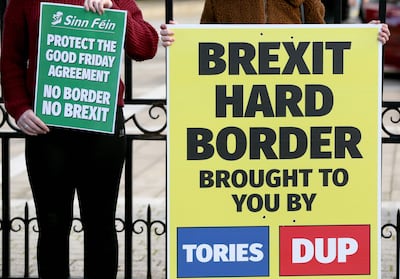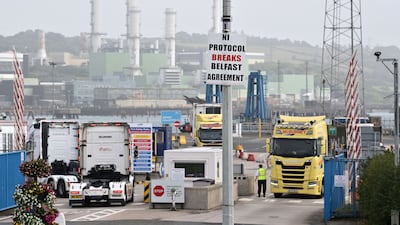With rising inflation, a winter energy crisis and a labour crunch, the last thing London should readily contemplate is a trade war with its closest partners.
A speech by a key government minister on Tuesday following a late-night Twitter spat with the foreign minister of Ireland would seem to indicate that the UK is girding itself for exactly that battle.
Lord David Frost, the UK’s Brexit negotiator, and Simon Coveney, Ireland’s Foreign Minister, traded Twitter blows as a looming showdown on the Northern Ireland protocol kicks into place.
Mr Coveney on Monday complained that any EU proposal to resolve the impasse was “dismissed by the UK” out of hand. He accused Britain of creating a “new red lines” by arguing that the EU’s European Court of Justice [ECJ] should not be the final referee in trade disputes.
Ensuring that the ECJ is not the ultimate arbiter is a fight the UK is willing to pick as it’s a fundamental view held by Boris Johnson and other Brexiteers.
When Lord Frost used Twitter to condemn Mr Coveney’s earlier comments, he prefaced his remarks with: “I prefer not to do negotiations by Twitter, but since @simoncoveney has begun the process …”.
Britain, he stated, had raised its ECJ concerns in July but “too few people seemed to have listened”. While he would look at the EU’s new proposals seriously there needed to be “significant change to the current situation if there is to be a positive outcome”.

Mr Coveney said British government was “shifting the playing field” because Whitehall knew “the EU cannot move on the European Courts of Justice,” the minister told Irish radio.
While accepting it was not diplomatic to tweet negotiations, particularly at the weekend, he then accused Lord Frost of anonymously briefing the British press on his demands.
In his speech to be given in Portugal on Tuesday, Lord Frost will argue that the current EU proposals are inadequate and call for the EU to lift its ban on mainland Britain’s chilled meats entering Northern Ireland.
If Europe does not accede to Britain’s demands to allow sausages from mainland UK into Northern Ireland this could lead to London triggering Article 16, allowed under the protocol for either side to avert serious economic damage.
The repercussions could also have an effect on security as well as the economy, further undermining the West’s unity, a Whitehall source warned.
“This is getting messy and could have wider implications for Britain and Europe, further deteriorating relations at a time when we should be united against the threats of China and Russia,” a Whitehall source told The National. “Worse still is the potential fallout as we all try to recover post-pandemic.”
A British move to suspend the post-Brexit Northern Ireland protocol could also pose a major test of European unity.
The protocol carries considerable importance as it avoids the need for a hard land border between Northern Ireland and the Republic of Ireland.
In order to complete the Brexit divorce talks last year, a compromise allowed Northern Ireland to be aligned to some EU law, essentially introducing a border between it and mainland UK.
But the implementation of the protocol has been interpreted differently by London and Brussels, leading to the current hostility.
Lord Frost will press hard to reduce EU border controls and the coming weeks will be a significant test of European unity in the face of British demands.
In the meantime, it appears that the UK is launching a dual strategy in which the new Foreign Secretary will launch a diplomatic charm tour of European states seen as potential allies.
Liz Truss will seek to win over the EU countries when she visits Italy, Spain and hosts the Baltic States.
Madrid will be particularly important as negotiations begin this week over the post-Brexit relationship with Gibraltar, the British territory bordering Spain. With 15,000 Spanish workers crossing over every day and Gibraltar contributing significantly to the wider area’s GDP, a settlement will be important.
But if Britain does trigger Article 16, it could have an impact on the Gibraltar negotiations along with other unforeseen consequences from a trade war that would damage both sides.


